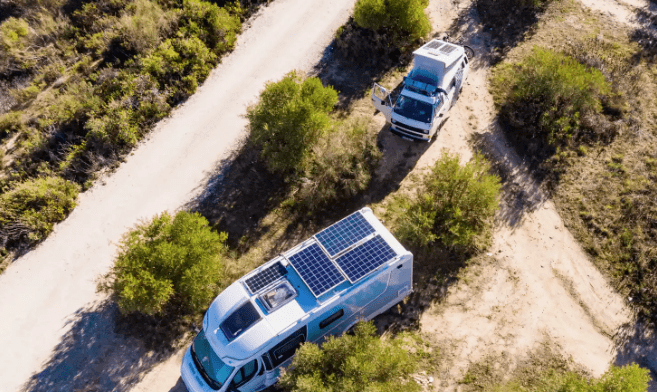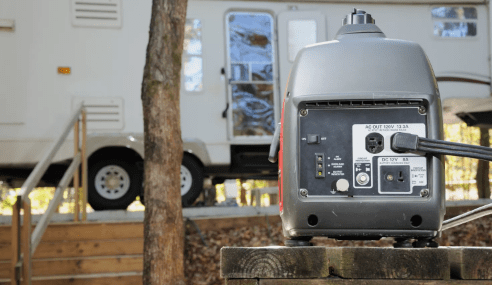Seeing solar panels on the roof of recreational vehicles (RVs) is becoming increasingly common. While solar panels cannot replace an internal combustion engine and turn your RV into an all-electric vehicle, they can allow you to run your lights and appliances cleanly, without relying on fossil fuel generators. Solar panels also allow you to camp freely off the grid and in places that don’t allow generators, without having to find an available connection at a crowded campground. Of course, using solar panels, you can reduce your carbon footprint. Here, we discuss RV solar components and whether they are worth investing in for your next RV trip.

RV Solar Components
RV solar is not as simple as connecting solar panels to the roof and plugging in appliances. Here are the main components of an RV solar system.
- Solar Panels
The panel can be flexible, portable, or rigid. Lightweight flexible panels are more suitable for molded rather than flat RV roofs, while portable panels can be placed anywhere on or off the vehicle so even if the RV is parked in the shade, they can still capture sunlight. Rigid panels are heavier, but they are also more durable and efficient. Panels can produce 150 watts of power in flexible and portable panels and up to 250-300 watts of power in rigid panels.
- Battery
Most RVs have two batteries. A 12-volt lead-acid/AGM starting battery is used to start the engine, while a 12-volt RV “house” battery bank is used to operate DC-powered equipment such as fans, lights, and water systems.
AC/DC inverters can provide 120-volt power through an RV campground “shore power” connection to power energy-intensive devices such as air conditioners, microwave ovens, and others. In more modern RVs, the old lead-acid RV battery bank has been replaced by lithium-ion batteries charged by solar panels and the RV’s engine-driven generator through DC/DC chargers. They provide faster charging speeds and longer battery life and are perfect for off-grid use.
Some RV owners have upgraded to lithium-ion batteries, which are lighter, more efficient, maintenance-free, can hold more energy, and have a longer lifespan. The downside is that they are much more expensive.
- Solar Charge Controller
The solar charge controller protects your battery by regulating the flow of current from the solar panel to the battery. The controller matches the voltage output of the solar panel with the voltage capacity of the battery.
- Inverter
Many RVs are already equipped with inverters, which convert DC power from the 12-volt battery into AC power for use by lights and other electrical equipment. More expensive inverters produce more reliable and stable power needed for sensitive equipment, such as electronics or medical devices.
- Transfer Switch
The transfer switch allows you to switch power from the battery to shore power when parked in the campground or turn off the propane source when driving.
Solar vs. Generator: Which is Better?

It’s not surprising that solar panels are more environmentally friendly than fossil fuel generators. Here are some other factors to consider:
(1) Energy: Solar panels require abundant sunlight to charge batteries, while generators require abundant fossil fuels.
(2) Space: Generators and their fuel take up a lot of interior storage space. Solar panels are limited by roof space.
(3) Flammability: Generator fuel (usually diesel, gasoline, or propane) is flammable. Some states prohibit the use of propane generators while driving.
(4) Maintenance: Generators require regular maintenance and leave sulfates residue in batteries. Solar panels require almost no maintenance other than dust and debris removal since there are no moving parts.
(5) Power Speed: Generators provide instant power. Solar power generation is slower.
(6) Cost: Solar panel installation costs are typically higher than generator costs, but once installed, sunshine is free and renewable.
(7) Noise: Running a generator at night in a crowded campground won’t win you any friends. However, absolutely quiet solar panels won’t produce anything at night.
(8) Emissions: Generators emit greenhouse gases, carbon monoxide, and particulate matter, while solar panels are emission-free. Solar panel manufacturing isn’t zero-carbon, but neither is the manufacture or operation of fossil fuels that run generators.
Installing Solar Panels on your RV
Installing solar panels on an RV isn’t any more complicated than installing solar panels on the roof. When you’re ready to buy and prepare for installation, keep in mind:
(1) Calculate how many panels you need. Determine your equipment’s power requirements and the number of hours you use them each day.
(2) Consider what equipment your RV already has. Many RVs come with solar or are solar-ready. For safety and efficiency, make sure your RV has enough large-gauge wiring to allow your panels to provide full power to your batteries.
(3) Buy everything at once. Every component of an RV solar system needs to be compatible with each other. RV solar panel kits cost more than buying each component separately, but their components are already compatible.
Installing an RV solar system involves potentially expensive upfront costs. However, these costs can save you electricity, fuel, and camping costs. Solar panels also reduce your greenhouse gas emissions. If you want to achieve zero emissions completely, you can consider taking electric vehicles for car camping road trips.
Frequently Asked Questions
- How many solar panels does an RV need?
A single 100-watt solar panel may be able to charge a 12-volt DC battery depending on the amount of daily sunlight received and energy consumption required. You may need multiple high-powered panels and multiple batteries to provide more power for longer periods.
- Are solar panels worth it for RVs?
It depends on your usage. Solar panels have higher upfront costs than generators, but if you rely heavily on off-grid solar power generation, it may be cost-effective. However, if you only park your RV in campgrounds with shore power, investing in solar panels may not be worth the cost and effort for you.
- How much do solar panels cost for an RV?
If your RV isn’t solar-ready, you may need not only a bare minimum 100-watt solar panel kit with mounting brackets and a solar charge controller, which costs as low as $150. Using lithium-ion batteries and multiple panels on the roof can cost thousands of dollars.

